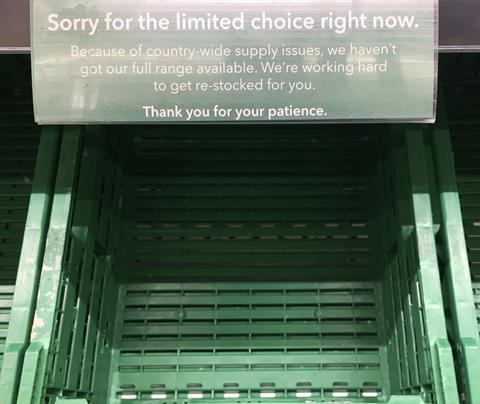The delivery firm warns that the UK fresh produce market is in crisis since Brexit import rules and the energy crisis have cut supplies

Britain’s grocery supplies are in crisis because of unseasonable weather, post-Brexit red tape and a decline in online orders post-lockdown, warns home-delivery specialist ParcelHero.
Supermarkets and online stores are struggling to maintain stocks and profits as the supply of UK groceries continues to stutter, it claims.
”Whether online or in-store, grocery supplies are in all kinds of trouble. Tomatoes, peppers and cucumbers are just some of the produce missing from our stores. That’s not only a problem for Britain’s supermarkets, where empty shelves reveal the extent of the shortages. It’s also another major headache for struggling home delivery grocers, who are finding the current market very tough going,” says ParcelHero’s head of consumer research, David Jinks.
”It’s true that unseasonal weather in Spain, where many of the UK’s tomatoes are sourced at this time of year, has caused a lack of supply. An extremely hot summer, followed by an extremely cold January, has had an impact. However, that’s not the full story. Supermarkets on the Continent are not rationing groceries, though they face the same climate issues.
”Here in the UK, why are vine tomatoes rarer than hen’s teeth (or even hen’s eggs, another item supermarkets are struggling to source)? The problem is that the UK is no longer in the EU’s single market and every consignment of ’plant products’ from the EU to the UK is supposed to require Customs declarations and pre-notification on the government’s IT system,” he continues.
”Suppliers in countries such as Spain and Holland are complaining that post-Brexit checks and paperwork are too time-consuming, and it’s far easier for them to sell all their produce to the EU. The BBC reports anecdotal evidence that Dutch drivers say it takes 77 hours of queuing to take tomatoes to the UK.”
There has also been a gradual reduction in the amount of fruit and vegetables grown in the UK, as soaring energy prices have made glasshouses increasingly unprofitable, Jinks says.
”Over the past few years, many producers have mothballed previously viable glasshouses and now more than 80 per cent of the UK’s fruit and almost half of its vegetables come from imports. British farmers’ and producers’ costs rose by 27 per cent between March and October 2022, threatening the viability of their businesses.”
Shoppers turning to the internet to find alternative sources for their groceries are likely to be disappointed, he adds.
”Ocado has a banner warning: ’We apologise that some salad and vegetables are currently out of stock. This is due to extreme weather across Europe impacting the growth and harvest of crops which has affected the UK’s supply.’”
That’s not the only problem Ocado faces, Jinks continues. ”Ocado Retail, the joint Ocado-M&S partnership, has posted a £4m loss for financial year 2022, with sales dropping to £2.2bn. Ocado Group as a whole suffered a loss before tax of £501m. In fact, in its 23 years of existence, Ocado has made an annual pre-tax profit just three times.
”It’s not the only online grocers to be suffering. Getir, the online same-day grocery delivery company, which was valued at $11.8bn (£9.8bn) and raised $786m (£653m) in funding as recently as last March, is reportedly planning to axe 200-300 jobs. That follows its merger with rival Gorillas in a $1.2bn (£0.99bn) deal in December. Both companies are struggling with sales and reportedly are now focussing on profitability rather than growth.
”In truth, the entire online grocery sales sector has struggled to achieve its potential, even at the height of lockdown,” Jinks says. ”It’s true online grocery orders more than doubled during the pandemic, peaking at 16 per cent of the overall UK food retail market, but that share fell to 11.6 per cent by December 2022, according to researchers Kantar.
”While that high of 16 per cent may seem a success, it’s considerably below the average for online sales as a whole,” he adds. ”Overall e-commerce sales, from clothing to hardware, reached a peak of 37 per cent of the entire retail market in February 2021, and have continued to average around 26 per cent for the past seven months. That shows that the online grocery sector’s current 11.6 per cent market share is far below its potential.”



